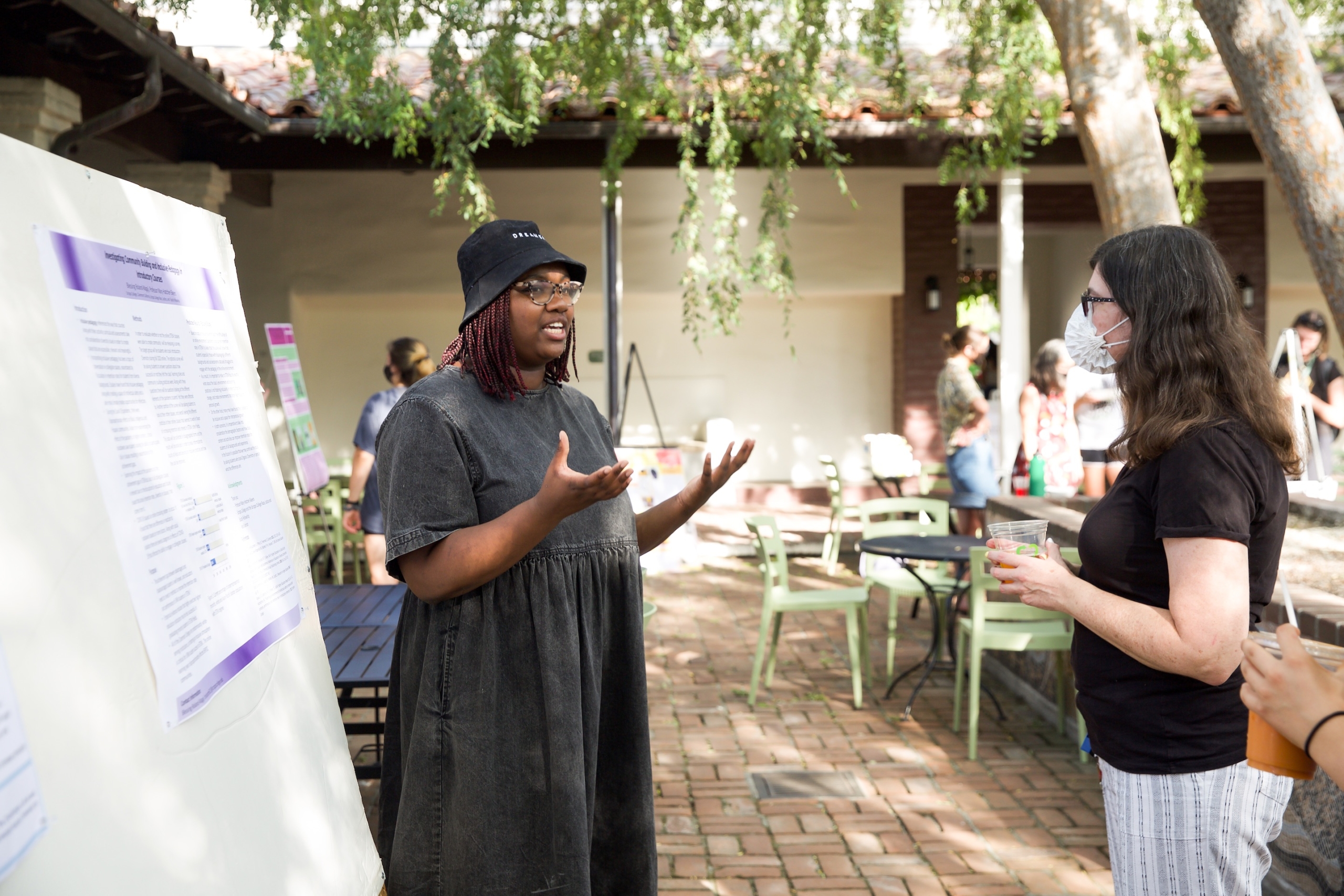By Emily Glory Peters
 Inaugural Racial Justice and Equity Fellow Blessing Nketchi-Etse Roland-Magaji ’24 presenting her research at Scripps’ Research Tea 2021
Inaugural Racial Justice and Equity Fellow Blessing Nketchi-Etse Roland-Magaji ’24 presenting her research at Scripps’ Research Tea 2021In September 2020, Scripps College received a landmark gift: $1 million from Trustee Gale Picker P’14, P’19 to advance racial justice and equity initiatives.
Combined with other gifts from Scripps alums, parents, and friends, Picker’s donation funneled critical support to the College’s existing resources and formed a wellspring for future programs. Nearly a year and a half later, we’re sharing the progress we’ve made and our ongoing efforts to make Scripps a more inclusive community.
Progress on new DEIJ initiatives at Scripps College
In spring 2021, the newly formed Racial Justice and Equity Fellowship awarded grants of up to $4,000 to four students and faculty to take a deep dive into antiracist research and community projects.
In addition to student fellow Blessing Nkechi-Etse Roland-Magaji ’24, whose project centered on expanding resources for Scripps BIPOC students in STEM, three faculty members also received grants: Lincoln Visiting Artist in Ceramics Jasmine Baetz, who is conducting a community engagement and campus education project in racial justice and equity discourses; alum and Consortium for Faculty Diversity Fellow and Visiting Assistant Professor of Psychology Melissa Mesinas ’12, who is studying social emotional learning competencies taught in Indigenous diasporic communities; and Assistant Professor of Africana Studies Maryan Soliman, who is researching the history of Black Studies at The Claremont Colleges.
“We developed a call and appointed a selection committee for faculty fellowships in the fall and student fellowships in the spring, and will host events to broadcast lessons learned with the Scripps community,” said Professor of Chemistry and Sidney J. Weinberg, Jr. Chair in Natural Sciences Mary Hatcher-Skeers, who advised Roland-Magaji on her fellowship project. “We’re hoping to continue to fund one to two fellowships every year.”
Picker’s gift also funded Hatcher-Skeers’ appointment as the College’s first associate dean of faculty for racial equity (ADRE) last spring. The ADRE develops and implements antiracist policies on campus and offers guidance to leadership on how to advance equity at Scripps.
Among other projects in her inaugural year as ADRE, Hatcher-Skeers worked with the Faculty Executive and Appointments, Promotions and Tenure Committee to develop new inclusive hiring practices for Scripps faculty; organized microagression and antiracist workshops; partnered with the seven Claremont Colleges to share diversity, equity, inclusion, and justice (DEIJ) programming; and has been working with several College departments to pilot new DEIJ goals, strategies, and reports that will be shared online.

Scripps’ faculty fellows for the Racial Justice and Equity fellowship: Melissa Mesinas ’12, Maryan Soliman, and Jasmine Baetz.
“The aim is to have all Scripps departments make [creating and tracking DEIJ goals] a regular practice, and to have reports available to the public on departmental webpages,” Hatcher-Skeers says.
The ADRE also joined Assistant Dean and Scripps Communities of Resources and Empowerment (SCORE) Director Marissiko Wheaton; Vice President, Secretary of the Board, and Convener of the Inlcusion, Diversity, Equity and Access (IDEA) Initiative Denise Nelson Nash ’76, and graduate fellow Liz Banuelos-Castro to form the College’s new Racial Justice Leadership Team.
Together, the team has led DEIJ workshops for campus constituencies, participated and shared insights from the Liberal Arts Colleges Racial Equity Leadership Alliance (LACRELA) econvenings, and published the College’s new IDEA Initiative newsletter to share DEIJ updates with the broader Scripps community.
Increasing the diversity of Scripps’ student body and faculty
A student body that represents different economic, cultural, and ethnic backgrounds is essential not only to create an equitable Scripps experience, but a more enriching one for everyone on campus. A portion of Picker’s gift supports new efforts to admit and enroll a more diverse range of student applicants.
“My goal with the Racial Justice and Equity Fund is to think strategically about our admission efforts so the gift has a long-term impact on students and our community,” says Vice President for Enrollment Victoria Romero.
Toward this end, last year Scripps’ Office of Admission implemented a print and digital communication strategy for BIPOC students to promote Scripps and boost attendance among students of color at the College’s 2021 fall recruitment events. The department’s new Fall Access Mentorship Program also connected eight underrepresented Scripps student ambassadors with 44 prospective BIPOC and first-generation students for a 10-week “college knowledge” program. Student ambassadors partnered with these potential applicants to share their knowledge of Scripps culture, the admission process, and demands of higher education.
In addition to these efforts, Admission has conducted a new discovery and creative campaign to enhance the College’s success in enrolling a greater number of Black students. Once identified, strategic levers will be used to engage Black students early to increase their awareness and affinity for Scripps as a college option.
Continuing efforts to reduce barriers to enrollment, Romero adds that the College is now covering the cost of health insurance for students with the lowest expected family contribution. The financial aid student contribution has also been capped at a fixed amount for all four years—something Scripps’ peer institutions tend to increase each year.
“This is especially helpful for our students with the most limited resources,” Romero says.
A shared commitment between Scripps and our community
While enhanced by Picker’s generous gift, efforts to address inequities at the College have been in play for years, and there is more to be done. Much of this work is made possible by Scripps supporters who are committed to helping the widest possible range of students experience all the College has to offer.
“Scripps College began as a place where women could access a level of education they were denied elsewhere,” says Associate Vice President for Philanthropy Enrique Gonzalez-Salgado. “Our progress toward racial justice and equity carries this same access-centered spirit, and we’re grateful to have a community that embraces this commitment and gives generously to make positive change possible.”
To make a gift to Scripps’ Racial and Justice Equity fund today, please click here. Thank you!

